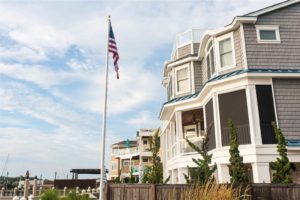 While most of us were distracted by the potential for a New Jersey government shutdown over Governor Murphy’s demand for revisions to the so-called millionaire’s tax this past fall, one tax provision found its way into the compromise legislation without much attention. Dubbed the “Airbnb” tax, the New Jersey legislature has adopted a tax of 11.6 percent of the fee paid for rentals of less than 14 days completed without a realtor. The tax applies to rentals statewide but its likely impact will be greatest felt in the shore communities from Stone Harbor to Barnegat. Though there are several ways to avoid the tax, such as renting for two weeks or avoiding websites that broker rentals without a realtor, the furor over the tax is likely to boil over as more owners become aware of its application.
While most of us were distracted by the potential for a New Jersey government shutdown over Governor Murphy’s demand for revisions to the so-called millionaire’s tax this past fall, one tax provision found its way into the compromise legislation without much attention. Dubbed the “Airbnb” tax, the New Jersey legislature has adopted a tax of 11.6 percent of the fee paid for rentals of less than 14 days completed without a realtor. The tax applies to rentals statewide but its likely impact will be greatest felt in the shore communities from Stone Harbor to Barnegat. Though there are several ways to avoid the tax, such as renting for two weeks or avoiding websites that broker rentals without a realtor, the furor over the tax is likely to boil over as more owners become aware of its application.
A recent article in the New York Times highlighted the experiences of many owners of property on Long Beach Island who in years past reported that their properties were fully rented for the coming summer season by March each year. As word of the tax spread, many summer beachgoers made other plans and rental owners reported a significant decrease in volume.
The new tax is levied at the rate of 11.6 percent, which is nearly equivalent to the 5 percent state tax on hotel rental income when added to the state sales tax of 6.625 percent that hotel occupancies are subject to. Many municipalities charge local occupancy fees as well. The state-wide rental tax is seen as a way of collecting taxes similar to what the typical hotel guest pays throughout New Jersey.
Once the summer rental season kicks off in late spring watch for protests from organized groups of rental owners as they seek to demonstrate that this new tax, which promises to raise millions in additional revenue statewide, has an adverse impact on tax revenue from Jersey shore communities during the all too important summer season. New Jersey is likely not the last state to consider such income to fill revenue-strapped state coffers.





